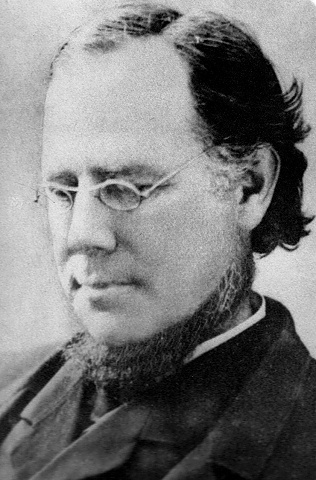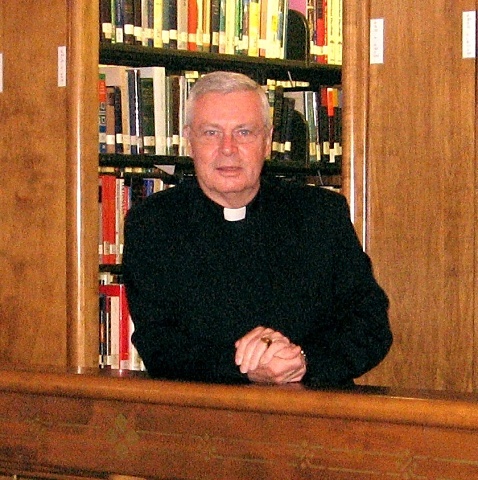October 1, 2012
This is the twenty-third in a series of previously unpublished reflections from the 1854 spiritual notebook of Paulist Founder, Servant of God Father Isaac T. Hecker. The reflection series is being made pubic in conjunction with Father Hecker’s cause for canonization. Father Paul Robichaud, CSP, Paulist historian and postulator for Father Hecker’s cause for sainthood, offers a response to Father Hecker’s reflection.

To love our neighbor as ourselves seems all the more difficult depending on how much we love ourselves. It is through charity that one learns to forget oneself, for charity exists not in but outside of self. God is charity. When God wishes happiness, it is not just for self but the greatest happiness for all. The more charitable we are, the more we are like God; and as thing alike readily unite, it follows that charity is the most immediate and hence the most expeditious means or our union with God. It is through the practice of charity that one learns to forget oneself. And the more we forget ourselves, the more God is watchful over us. He who has totally forgotten himself is wholly directed by God. It is only through charity that God dwells within us.
A true act of charity is worth immortality; for God has been in its beginning, middle and end. For the one who sees nothing but creatures in the creature, who has no other love but natural affection; will never do an act of charity, for God must be its object. For true charity consists in the perfect forgetfulness of self for the good of another. The greater cannot forget itself or lose itself in the lesser. For a perfect act of charity God must be the object.
Three things are necessary then for every perfect act of charity: the action of the Holy Spirit; the forgetfulness of self; and the view of God alone as the object. In a word, every perfect act of charity makes heaven descend upon the earth and elevates the doer to a fellowship with the angels.

Charity is an English translation of the Scriptural word agape (from the Greek New Testament) or caritas (from the Latin Vulgate). In modern English usage charity is often thought to mean benevolence to those in need. At times when the word charity is understood as benevolence, it can be used in a patronizing manner or carry negative judgments about the recipients of our charity. This self-centered and judgmental understanding is the antithesis of what the Scriptures teach about charity. In today’s reflection Father Hecker attempts to elevate and empower the Scriptural word by restoring it as one of the three great theological virtues (faith, hope and charity) and by grounding it in God’s action and not our own.
As Christians we are capable of loving God and neighbor because God has first loved us. As Saint Paul says in Romans 5 “God has poured out His love into our hearts through the Holy Spirit which He has given to us.” Father Hecker understood this mutual exchange of love as how a Christian grows in God. God’s love and our love in response, brings about a growing union with God. A perfect act of charity has three parts. First, our ability to love, our charity comes about as a response to God’s love. Second it involves a forgetfulness of self. Its not about us and our generosity. Finally to paraphrase Blessed Teresa of Calcutta, we see God in the face of the other. Our response to God in the other is a participation in a divine movement of love, and it brings us into union with God.
So for Christians, charity is not an act of benevolence. It does not come with judgment, either at what we give or the worthiness of the recipient. Christian charity involves a forgetfulness of self and a total giving in response to God. As Father Hecker notes, “For the one who sees nothing but creatures in the creature, who has no other love but natural affection; they will never do an act of charity, for God must be the object.”
About Father Isaac Hecker’s 1854 Spiritual Notebook:
Servant of God, Father Isaac Hecker wrote these spiritual notes as a young Redemptorist priest about 1854 and they have never been published. Hecker was 34 years old at the time, and had been ordained a priest for five years. He loved his work as a Catholic evangelist. The Redemptorist mission band had expanded out of the New York state area to the south and west, and the band’s national reputation grew. Hecker had begun to focus his attention on Protestants who came out to hear them. To this purpose Hecker began to write in 1854 his invitation to Protestant America to consider the Catholic Church, “Questions of the Soul” which would make him a national figure in the American church.
Hecker collected and organized these notes that include writings and stories from St. Alphonsus Liguori, the Jesuit spiritual writer Louis Lallemant and his disciple Jean Surin, the German mystic John Tauler, St. Thomas Aquinas and St. Jane de Chantal among others. These notes were a resource for retreat work and spiritual direction and show Hecker’s growing proficiency in traditional Catholic spirituality some ten years after his conversion to the Catholic faith. They are composed of short thematic reflections.